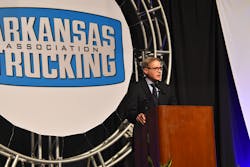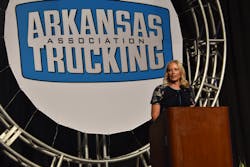'Unprecedented' time, unprecedented recognition for trucking: Spear
HOT SPRINGS, Arkansas — The ongoing pandemic and the challenge to the U.S. economy have brought the importance of trucking to the forefront—and the resulting boost to trucking’s public image during the “unprecedented” recent months has already earned dividends with Congress and the White House, as American Trucking Associations President and CEO Chris Spear told affiliate members here Aug. 25. And those policy wins will continue.
“I generally tend not to spend time talking about what we've done, but what we're going to do,” Spear said, delivering his keynote remarks for the Arkansas Trucking Association’s 2021 Business Conference and Vendor Showcase. “But in hindsight, who would have thought a global pandemic would elevate trucking, the role that our employees—particularly our drivers—do day in and day out, with really no recognition or appreciation?”
And while a shortage of toilet paper and staples such as milk and bread certainly brought the supply chain challenges home to Americans, truckers really “got the job done” with delivering personal protective equipment to frontline healthcare workers from the very beginning, and subsequently delivering vaccines from coast to coast.
Those efforts earned a second trip to the lawn of the White House, where an appearance by 12 ATA America’s Road Team captains—with a combined 26 million accident-free miles—generated 4 billion positive media impressions, by ATA’s count.
“It wasn't about Donald Trump; it was just an opportunity to recognize—from the leader of the free world—the work that our industry, our drivers, do day in and day out,” Spear said. “From that moment on, you saw a surge with our industry’s image, how we are perceived—but, more importantly, how we want to be perceived—throughout this country.”
In driving back and forth from ATA’s Washington offices to his home in Wyoming, Spear saw firsthand the cornfield billboards, the banners on overpasses, and the police escorts recognizing and thanking truck drivers.
“Boy Scouts, Girl Scouts coming up to the cabs of our trucks, handing out baked goods at truck stops: that is unprecedented recognition in every state, every congressional district, and community in this country,” Spear said. “You can't possibly buy that kind of exposure. That is an image that our workforce, our industry, deserves.”
The timing couldn’t be more critical when the political atmosphere inside the Capitol is “more toxic, more difficult than ever before,” Spear noted, and added that he’s spoken at the annual Arkansas meeting at least three times in his five years as head of ATA.
“Every time I get here, I say it can't get any worse,” he quipped. “Ladies and gentlemen, it has—again.”
And the way to get the attention of policymakers, and to counter the “flawed” narratives and legislative proposals that would harm trucking, is to respond with the truth—with data, and with the industry’s own narrative.
“It's not emotion, and it's not rhetoric. It's telling our story—at the highest volume,” Spear said. “And that image, that crest of that wave, applies to every issue: Democrats, Republicans, it doesn't matter.”
That bipartisan influence has been critical, Spear explained. While trucking held a place of honor at the Trump White House, the previous administration never delivered an infrastructure package—a longstanding “Tier 1” ATA priority. Indeed, Spear and other ATA representatives have appeared 25 times before Congress, “telling our story and why it matters,” he added.
So, with Joe Biden in the White House and the Democrats in control of Congress, ATA resolved to “work our tails off” to ensure that the priorities of a new administration didn’t interfere with the trucking industry agenda as the proposed trillion-dollar infrastructure bill—passed by the U.S. Senate Aug. 11—was being hashed out.
“Don't let the perfect be the enemy of the good,” Spear said. “This Senate bipartisan product, despite all of its faults—and I can tell you, there are many—overall is good,” Spear told the Arkansas crowd. “It's not what's in this bill; it's what's not in this bill.”
Specifically, ATA has been successful in blocking proposals that would have allowed additional tolling on Interstates, and a truck-only vehicle-mile tax. Most significantly, ATA kept pro-labor language out the infrastructure bill, including:
- Organized labor’s PRO Act, which would "tip the balance" of the 1935 National Labor Relations Act away from employers in favor of unions, making it much easier to organize.
- Federal language that would have supported California’s AB 5, to make it more difficult to classify workers as independent contractors. ATA was successful in getting the U.S. DOT to declare superseding federal authority, which was then upheld in court. But House Speaker Nancy Pelosi, from California, had wanted to include a provision to revoke the F4A decision—yet, again, ATA prevailed with lawmakers by emphasizing the importance of trucking to every district in the U.S.
“We play in six committees; it’s very strategic and it works,” Spear said. “It was your story, that wave we were riding. That's what got that language out. [Legislators] began to recognize those special interests—those powerhouses that pour millions, if not billions into their coffers—really don't represent America. Trucking does. That's telling your story, at the highest volume; that's moving the needle.”
Of course, fighting lawsuit abuse is also a top priority for ATA, but the political disarray in Washington has made a comprehensive federal solution unlikely in the near future. So, ATA has taken the fight to statehouses.
“I am proud to say we have had comprehensive wins in Iowa, Missouri, Louisiana, West Virginia, Montana, and just two months ago, in the great state of Texas,” Spear noted. “That is leveraging our posture, our know-how, telling our story—which is impactful—and making certain that every member of a state legislature understands the vile profession of the trial lawyers.”
He pointed to a recent billion-dollar award in Florida as a prime example of a “nuclear verdict” gained through “reptile theory.”
“This is about putting you out of business, putting people out on the unemployment ranks, taking food off of their table—just to line [the lawyers'] pockets,” he continued. “You know full well that's going to get appealed and settled. But that's going to cost companies millions to litigate. They are bleeding this industry and it is high time we do not roll over.”
Spear also touched on the importance of ATA being at the table for the development of state and federal emissions regulations and electric vehicle adoption timelines.
“Let's just have a dialogue; let's talk about these things—that's what business leaders do,” Spear said, referring specifically to the rush toward vehicle electrification with little discussion of the challenges to the power grid. “You don't invest in anything without having those parameters defined, those questions answered. And that's simply all we're asking for: Let's have an honest debate.”
To that end, Spear encouraged the audience to “step up to the plate, join up, get loud, get engaged.”
“I just described the unions, the plaintiffs bar, and the environmental crowd—three formidable foes, now better situated than anybody out there,” he concluded. “That's our headwind, that's our competition. This is real. These are the foes that would love nothing more than to put you out of business. So I need more of you to amplify that volume.”
About the Author
Kevin Jones
Editor
Kevin has served as editor-in-chief of Trailer/Body Builders magazine since 2017—just the third editor in the magazine’s 60 years. He is also editorial director for Endeavor Business Media’s Commercial Vehicle group, which includes FleetOwner, Bulk Transporter, Refrigerated Transporter, American Trucker, and Fleet Maintenance magazines and websites.
Working from Beaufort, S.C., Kevin has covered trucking and manufacturing for nearly 20 years. His writing and commentary about the trucking industry and, previously, business and government, has been recognized with numerous state, regional, and national journalism awards.


